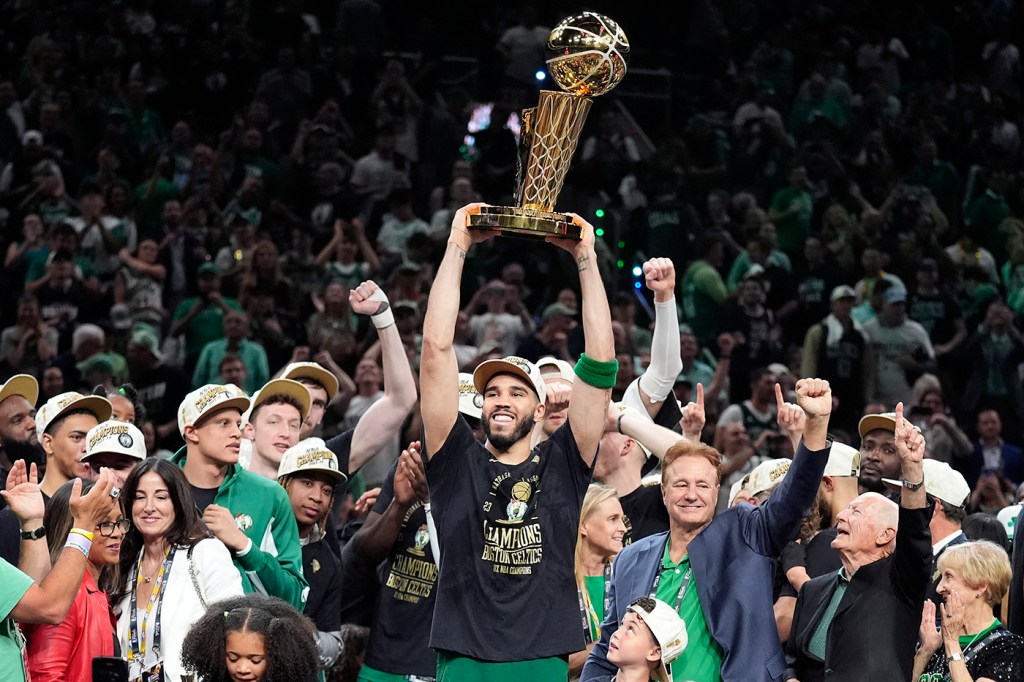Why the Boston Celtics’ sale that could top $4.7 billion signals a booming market for sports franchises
“There are plenty of stories of bubbles, but I think we’re far from the bubble, far from bursting the bubble,” says Evodio Kaltenecker, associate teaching professor in Northeastern’s D’Amore-McKim School of Business.

Two weeks after capturing the NBA championship, the Boston Celtics announced the winningest franchise in the league was up for sale.
The announcement comes just a few months after the Dallas Mavericks were purchased for nearly $4 billion and just over a year since the Milwaukee Bucks were acquired for $3.5 billion. The Phoenix Suns sold for $4 billion in 2022. In the NFL, the Washington Commanders sold for over $6 billion last year and the Denver Broncos went for $4.65 billion the year before.
Is a bubble ready to burst on professional sports franchises?
No, professional sports franchises remain a solid investment, says a Northeastern University business expert.
“There are plenty of stories of bubbles, but I think we’re far from the bubble, far from bursting the bubble,” says Evodio Kaltenecker, associate teaching professor in Northeastern’s D’Amore-McKim School of Business. “I think it looks good for several years on the horizon.”
Sports franchises are a limited asset and very attractive to billionaires, according to Kaltenecker, and they continue to have “tangible drivers of profitability.”
After 22 years of ownership and a value increase estimated at over $4 billion, the majority owners of the Boston Celtics, Boston Basketball Partners LLC, recently announced their intention to sell the team. The controlling family of the ownership group, the Grousbecks, said, “after considerable thought and internal discussion, it has decided to sell the team for estate and family planning considerations.”
The group said it plans to sell a majority stake in 2024 or early 2025, and the balance in 2028. Wyc Grousbeck would remain as governor of the team until the second closing in 2028.
The Grousbeck ownership group — which includes Steve Pagliuca, co-chairman of Bain Capital — purchased the Celtics for $360 million in 2002 from the Gaston family, which had bought the team for $18 million in 1983. The team is currently valued at $4.7 billion by Forbes.
Kaltenecker says he has seen that sports franchises in four of the largest leagues in the United States outperformed Standard & Poor’s 500.

“It’s a little bit of an opportunity to invest in a profitable business and also the diversification of traditional business. It’s a solid yes (to invest) if you look at previous deals,” Kaltenecker says.
These professional teams are expanding internationally and creating an “ecosystem of businesses” locally by building through a mix of sports and hospitality, Kaltenecker says. They are developing synergies around the teams, with an arena, hotels, shopping center, retail shops, merchandising, restaurants and more. Selling content and experiences.
“There are opportunities for additional growth. I see it as a good investment for smart investors,” Kaltenecker says. “So this ecosystem can be improved. It can become really profitable, no pun intended, if the investors play the right game.”
On top of that are media rights, Kaltenecker says, as television contracts continue to rise.
The NBA is going into the final year of a nine-year media deal that generates an average of $2.67 billion per season. A new deal is currently being negotiated and is expected to be a long-term agreement with an average of at least $6 billion per year, which would more than double the contract now in place, according to reports.
The Celtics, with 18 NBA championships, are the winningest franchise in the league. Under the Grousbecks’ ownership, the team has won two titles, this year and 2008.
Featured Posts
The face of ownership has been Wyc Grousbeck, one of four children of Irving Grousbeck, 89. Irving Grousbeck, who has nine grandchildren, made his fortune as co-founder of Continental Cablevision in 1963. Forbes lists Irving Grousbeck and the family’s worth at $1.8 billion.
So why are the Grousbecks selling now?
Kimberly Eddleston, Schulze Distinguished Professor of Entrepreneurship and Montoni Research Fellow with the D’Amore-McKim School of Business at Northeastern University, says it sounds like Irving wants to capitalize on the team’s value and preserve the wealth for current and future family members.
“Irving’s 89 years old, and I think he wants to get his estate in order to leave the legacy that he wants to leave for his family, for this generation, and multiple generations moving forward. I think he’s very concerned about leaving them a really nice nest egg,” says Eddelston, an expert on family business.
“Preserving all that wealth they’ve built over the years and probably making sure that it’s fairly distributed, amongst his children, his grandchildren, and someday his great great grandchildren so they, hopefully, stay a nice united family. That’s a real concern I’m seeing when I work with families, they have a real concern of leaving and keeping the family intact,” Eddelston says. “So one of the reasons businesses are sold and estate planning occurs, a very common reason, is to maintain family harmony and to mitigate or reduce any kinds of conflict.”
Wyc Grousbeck, CEO and governor of the Celtics, told CNBC he is not the sole owner of the team.
“I want to just clarify, it’s not my majority stake. The control of the team is owned by my family,” Grousbeck told CNBC. “So it’s a family that I belong to and then I have the Celtics family that I also belong to. So there’s an intersection and there’s an involvement. The family has been involved for 22 years. There’s been discussions and thoughts about estate planning and family planning.”
Eddleston says the Celtics have great value right now but all family members may not be able to capitalize on it unless the team is sold. In addition, estate taxes are scheduled to go up in 2026. Wyc Grousbeck has often said that the owners are “paid in parades.” So a sale would provide all family members with access to the wealth.
“(Irving) seems like a very brilliant businessman. From a family business perspective, I wouldn’t be surprised if advisers are saying, now is the time. And if you want to make things fair and have control over how your assets are distributed, and make sure taxes are minimized, this is the time,” she says.











